Saturday was a long ‘un. After our workshop (and fish pie) we dashed off to Aldeburgh to attend the conversation with Sharon Olds. Michael Laskey presided, in place of Philip Levine who’d had to cancel, and did an admirable job of getting some background from a poet who’s been reviled and revered in equal measure, it seems.
Laskey asked her about some of the “strongly felt and strongly put” criticism that must have made her career deeply uncomfortable at times, from, as she said, “critics who were at pains to tell me why what I did was not poetry.” Although she’d been writing for many years, she’d taken a long time to publish her poems, which she’d really never thought anyone but she would see (her first collection came out when she was 37). She’d tried to learn to cope with the hardest criticism: over time she was able to drop one phase of her response to it – the four parts of which were to burst into tears, throw up, fly into a rage, and finally fall asleep. At one point she actually made a chart listing her poems, with the negative adjectives attributed to each, and tried to learn from this what emotions certain themes were raising in her critics. It’s hard to imagine anyone surviving the kind of battering she’s had on the public stage; how much does prescriptive criticism really help? Give me instead the school of thought that says if you don’t like it, don’t read it — and move on.
In terms of process, she said she’d historically always written very quickly and often in single drafts with little or no changes, a process of gathering, and at a certain point “the gates open and the poem comes out.” She says she revises more nowadays, and her editing rule is to write the draft and then “remove half the adjectives and a third of the self pity, so the poem doesn’t have to carry so many rocks in its pockets.” She remarked on the danger of place-holders: words she’d stuck in her lines while she tried to think of something better, which to her surprise began to resonate with the music and sense of the poem so that it would become difficult to get rid of them later. She spoke of the importance of the “objective correlative” – an object that correlates to some emotion in the poem – without which the poem might blather on, self-absorbed, talking about itself too much instead, let’s say, of the tiny pair of scissors.
Her aims in the bigger world of poetry are to increase poetry’s reach and to help it to join with the wider communities in which we live. She said she’d been inspired by Jean Kennedy Smith’s founding of Very Special Arts in the 1970s, and that her dream – attempted when she was Poet Laureate of New York State – had been to try to encourage every writing MFA program to reach out to jails, mental institutions, hospitals, special schools, hospices and introduce writing programs in these. She feels it is a profound way to extend the usefulness and place of poetry into a larger world, and create a community for poetry – as well as a means of providing teaching experience to writing program graduates.
Next on the bill was the Master Class Poetry Workshop, led by Vicki Feaver with Michael Laskey co-hosting. Following a time-tested format, the Aldeburgh master classes present poems selected from the work of experienced but not necessarily widely published poets which are discussed first by the workshop leader, then the other participants, and finally by members of the audience, before the poet may – if wished – say a few words in response. The participating poets were Julia Bird, Administrator of the Poetry School, up and comer Valeria Melchioretto, and Sam Riviere – whose nicely turned poem “The Kiss” seemed the most technically interesting, being written in paired statements, employing some of the constraints of the palindrome:
the more she thought
the more she thought
she’d keep it to herself – he’d never know
exactly how it happened (she didn’t know)
and he’d see replays of her face
opening and reaching towards his face
.. and so on. Useful quote du jour from Vicki Feaver: “One test of a good poem is to ask if it’s about more than one thing.”
Finally we moved into our third and final event of the day, once again balancing on the brink of perishing hunger and fatigue, and by now more than well burdened by books. We were all delighted by the Scottish poet Alastair Reid, unknown to all of our group but historically much published and apparently all out of print – a situation the festival organisers had deftly dealt with by publishing a fine little chapbook that many of us snapped up. He was a delightful reader and a name to look out for. He was followed by a distinguished Spaniard, Joan Margarit, whose passionate recitations in Catalan were interlaced with softer renderings of the English translations by Anna Crowe; best bits were his daring to read two translations himself, expressive and entirely well spoken. Final reader up was Sharon Olds, who read mostly new work, including poems of humour and wry digs at her critics, in her usual gracious manner and clear, simple style.
Enough food for the mind: off we went to our long awaited meal at 152, where 10 of us shared a groaning board. Pot-roasted pheasant for me, with braised red cabbage (with fennel? anise? some unusual and not unsuccessful seasoning) and a glass or two of tempranillo, followed by my dish of the day: coffee creme brulee. A perfect ending.



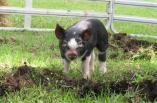
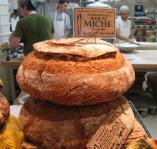
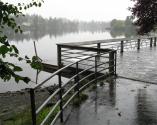
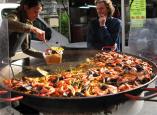
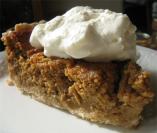
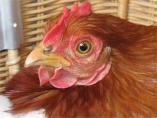
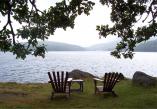
0 Responses to More Aldeburgh Poetry